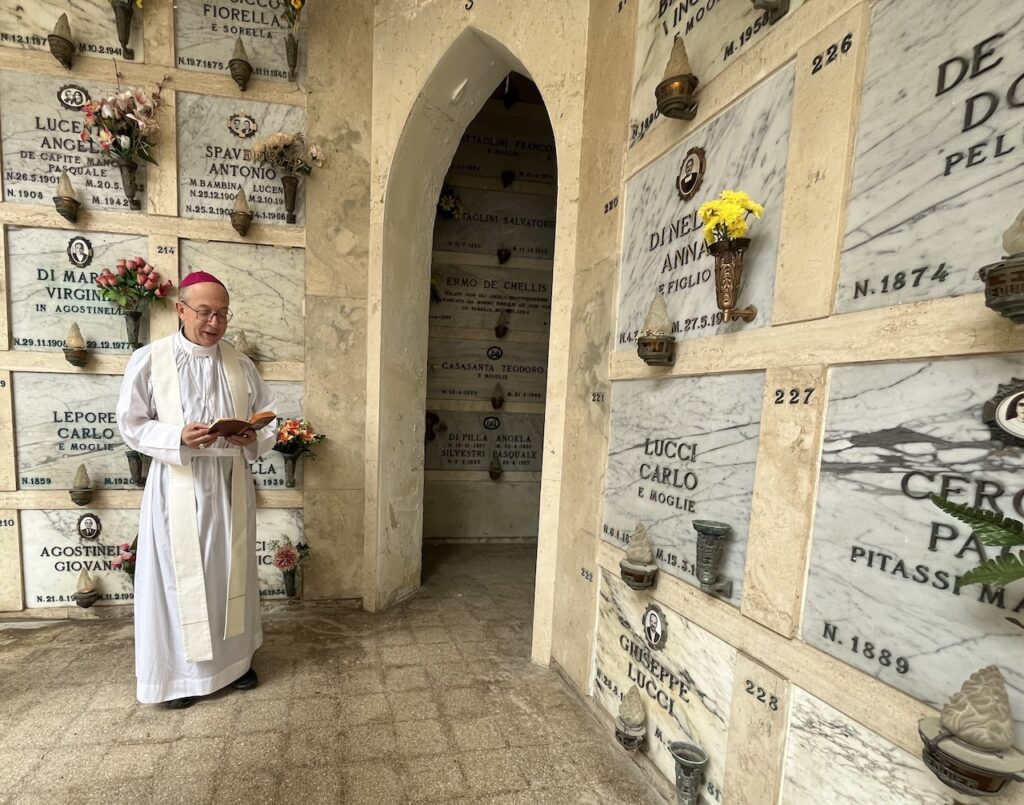Last month, I was in Rome as part of a pilgrimage with members of the Basilica of St. Andrew, Roanoke, and to visit our seminarians, who are studying at the Pontifical North American College. While there, I also visited Pacentro, my grandfather’s hometown in Italy.
I got to see where my mother’s father was born and where he lived until his teenage years, before poverty forced him, along with others in the community, to seek a life in the United States. On a previous trip, I visited my elderly great-aunt in an assisted living facility which was a converted Franciscan monastery. This time, I prayed at the cemetery where my mother’s grandparents and aunt are buried.
Keeping a connection with the generations that have preceded us is important.
I was very young when my grandfather passed away in his 60s, but I treasure my experiences and value those memories that I have of him. Remembering something as simple as him attaching a sled to a small tractor and pulling us around the backyard that served as his extensive vegetable garden makes me smile.
It also calls to mind my grandmother, who made sure we were immersed in all the Italian traditions for Christmas and Easter. Through our periodic visits to their house, we would catch up with them, aunts, uncles, cousins, etc., share stories and, of course, be fed great Italian meals.
With the elderly – especially our grandparents – we have a connection to the past, i.e., family history and legacies. Not only do we have memories of them, but they are, now in their later years, the living memory of family life and events. They are the ones who can look at an old black and white photograph in which no one is identified and tell you who the people are and tell a story about the event at which the picture was taken.
I associate the elderly with my recollection of the rituals, events and activities that mark important moments because they were part of them. They took time to engage in their children’s and grandchildren’s lives because they treasured seeing the next generation grow up and carry on family traditions.
I see this among my siblings as they are now grandparents. They want to highlight and share the milestones they see in their grandchildren. Just as my grandparents could share their stories of immigration, marriage, early family life, and living through the Great Depression and World War II, so, too, can today’s grandparents relate their experiences of growing up in the ’50s, ’60s and ’70s.
One thread that was deeply woven into my grandparents’ stories was their experience of faith. The local parish which was made up of a large number of Italian families was central to and an integral part of their lives. From that came the practical piety that impacted their daily lives.
In recent months, I’ve celebrated the 35th anniversary of two of our diocese’s assisted living facilities – Marian Manor in Virginia Beach, and Our Lady of the Valley in Roanoke. During those celebrations, I spent time with residents who expressed joy and appreciation that the Church has provided residences where they receive quality care, including pastoral care.
That is also what I hear when I visit our other assisted living facilities – Our Lady of Hope, Richmond; Our Lady of Peace, Charlottesville; Our Lady of Perpetual Help, Virginia Beach; St. Francis – Manchester, Richmond; and St. Mary’s Woods, Richmond.
Listening to the stories about the elderly’s experiences are occasions for us to learn about the past and from the past so our lives might be better. Hearing their stories calls to mind the words of Maya Angelou: “You can’t really know where you are going until you know where you have been.” The elderly’s narrative of “where you have been” is their gift to us.
During his pontificate, Pope Francis has noted his own aging and has highlighted the elderly, including establishment of the World Day for Grandparents and the Elderly in 2021. This observance takes place annually near July 26 – the Feast of Sts. Joachim and Anne, grandparents of Jesus.
When he addresses the elderly, Pope Francis also speaks to younger generations – noting that their connection with older generations is a blessing.
“The special sensibility that those of us who are elderly have for the concerns, thoughts and the affections that make us human should once again become the vocation of many. It would be a sign of our love for the younger generations. … A long life – so the Bible teaches – is a blessing, and the elderly are not outcasts to be shunned but living signs of the goodness of God [emphasis added] who bestows life in abundance…” (Message for second World Day for Grandparents and the Elderly, July 24, 2022).
May we always respect, learn from, embrace and express gratitude for the elderly who are part of our lives.

